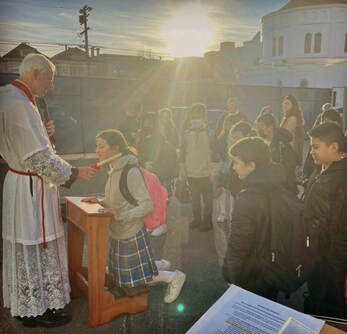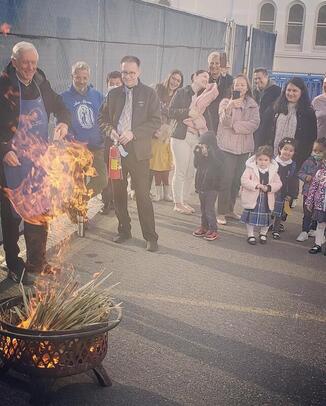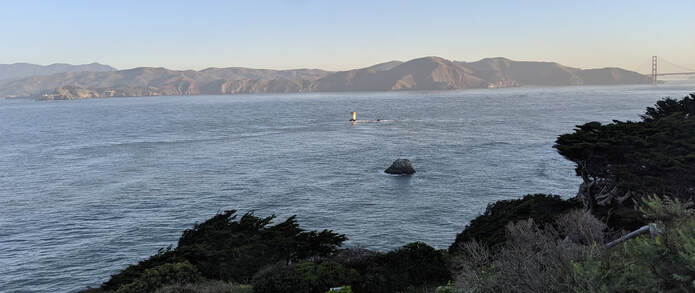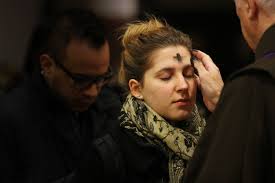Gandalf assures no victory in the short term. “I have spoken only of hope. Hope is not victory,” he tells Aragorn. The dark armies of Saruman’s Mordor “fill me with great sorrow and great fear: for much shall be destroyed and all may be lost. I am Gandalf, Gandalf the White, but Black is mightier still.” And so they ride on, to the defense of Helm’s Deep. Mighty seas of orcs assault the fortress all night, but when all is certainly lost, Aragorn still hopes for the dawn. “None knows what the new day shall bring” he declares to the surging enemies. At dawn Aragorn and King Theoden boldly ride forth, right through the enemy, and indeed salvation does come with dawn. Gandalf and the Forest of Fangorn arrive as the sun breaks over the eastern horizon. Such did the sun rise almost 2000 years ago on a hill outside of Jerusalem, on a day which we now call "Easter." The Lord of the Rings is a great Catholic book about hope, foretelling the Return of the King. He will certainly return in great power and glory on the clouds of heaven. It is for that we wait in hope during our long pilgrimage. It is for the Coming of That King that we look toward the East, at every Mass. May He come quickly!
|
I’m making my way through The Lord of the Rings again (I read the trilogy every ten years or so). I can’t resist underlining certain passages, although I use the pen sparingly in respect for the golden words of the author. Here is something I wanted to remember from The Two Towers: Gandalf persuades Aragorn to lend his sword to the hopeless defense of Helm’s Deep. “War is upon us, a war in which only the use of the Ring could give us surety of victory.” They are all tempted to use the immense power of “The Ring” against the Black Power that forged it. But we must never use the tactics of the Enemy, even when it seems the only way to defeat that Enemy. Rather, we must exercise the Christian virtue of hope, even when there is no hope. We must hold fast our belief that the power of Good is always greater than the power of Evil, even it we will not see it in our time.
Gandalf assures no victory in the short term. “I have spoken only of hope. Hope is not victory,” he tells Aragorn. The dark armies of Saruman’s Mordor “fill me with great sorrow and great fear: for much shall be destroyed and all may be lost. I am Gandalf, Gandalf the White, but Black is mightier still.” And so they ride on, to the defense of Helm’s Deep. Mighty seas of orcs assault the fortress all night, but when all is certainly lost, Aragorn still hopes for the dawn. “None knows what the new day shall bring” he declares to the surging enemies. At dawn Aragorn and King Theoden boldly ride forth, right through the enemy, and indeed salvation does come with dawn. Gandalf and the Forest of Fangorn arrive as the sun breaks over the eastern horizon. Such did the sun rise almost 2000 years ago on a hill outside of Jerusalem, on a day which we now call "Easter." The Lord of the Rings is a great Catholic book about hope, foretelling the Return of the King. He will certainly return in great power and glory on the clouds of heaven. It is for that we wait in hope during our long pilgrimage. It is for the Coming of That King that we look toward the East, at every Mass. May He come quickly!  Blessing of Throats on St. Blaise Day at our school Blessing of Throats on St. Blaise Day at our school We are in that Lenten archipelago between solemnities: St. Patrick (which is a first class feast in San Francisco), St. Joseph, and the Feast of the Annunciation. Last Thursday I celebrated St. Patrick’s Day by skiing in the Sierras with a true Irishman, on Saturday I celebrated St. Joseph’s Day by offering Mass for a true Israelite (one of our Jewish catechumens), and this Friday I will celebrate the Annunciation by welcoming the firstborn of a new Mother (Maggie Tuttle, leader of our Young Adults, married another Young Adult, the Australian Simon Takita, and will have her first child on March 25). I rejoice in the panoply of cultures and characters that find a home at my beloved parish. No one is more multicultural or inclusive than the Catholic Church, “here comes everybody” in the words of the Irish novelist James Joyce. Our school also welcomes everybody, and not only that, it pays for them. The cost of educating a student at Stella Maris Academy, San Francisco’s only Catholic Classical Integrated K-8, is running about $20,000 a year for each of our initial fifty students. 70% of these students cannot afford to pay full tuition, so the $800,000 shortfall this year is covered equally by godly benefactors ($400,000) and parish income ($400,000). Our plan, of course, is to increase enrollment and so bring down the per student cost, but for the first two or three years the Academy will be a significant financial commitment to parish and benefactors. God reward those who have made possible what the Archbishop hopes is the first of many classical Catholic schools in San Francisco. We just produced our first video since the school opened. It portrays the students, the teachers, and the culture of the Academy in living color. Have a look at this beautiful 3 minute 48 second work of art: https://www.youtube.com/watch?v=aCJRly1jzyM If you like what you see, send this link to your friends so they can rejoice with you about what is happening in San Francisco. We need more students and we need more benefactors, and I know God will provide both. Get the word out, and if you have the means, make a gift to the school through our parish website, HERE (under “Stella Maris Academy Supporting Gifts”). Grant, O Lord, that we may begin with holy fasting this campaign of Christian Service, so that as we take up battle against spiritual evils, we may be armed with weapons of self restraint.
With these words your priests opened the holy season of Lent last week at the Ash Wednesday Masses. Lent is a time of fasting (in German, Lent is Fastenzeit or “fasting time”), and in normal times the best fast is from food. We must fast from food and drink, but I think in our time it’s even more important to fast from noise. God created the world in silence; the sun, the moon, and the stars move in silence. In silence, when night had completed half its course, God came into this world at Bethlehem, and in the silence of the early dawn 33 years later He rose from death. God is the friend of silence, and in the silence of the heart God speaks. We must cultivate not just silence of the ears, but silence of the eyes, stillness of the body, quieting of the mind: silence of the soul. The world, the flesh, and the devil conspire to shout down the silent Word who speaks to us in silence. We must endeavor to regain our peace in a disturbed and disturbing world. Virtually unlimited digital media amplifies the turmoil that confronts us 24/7. Commercial news media sell their product by insisting that almost everything is a “crisis,” but I think there are darker forces behind this constant agitation (what we call “stress”). Shrieks and howls, anger and disturbance, panic and revolution mark the demonic, of whom commercial media are only the witless instruments. The most effective assault of the evil one in our time is noise, but we have a most effective defensive weapon: choosing silence. “Filled with the Holy Spirit, Jesus was led by the Spirit into the desert.” He goes into the wastes of Judah, the rocky solitudes where not even a leaf rustles or a stream murmurs. Absolute stillness. After forty days, a noise breaks into the stillness, tempting him with food, glamour, and power. Let us consider only the second temptation: Satan shows Jesus all the kingdoms of the world in a single instant: every city on earth with every sound and light generated by every entertainment venue, every movie and every song ever produced (Netflix tells us we can have access to 3.5 million movies and 5 billion songs, all for one low price). “I shall give to you all this power and glory, for it has been given over to me, and I may give it to whomever I wish.” Satan owns the power of 5G, the glory of every glittering skyscraper and every glamorous movie star has been given over to him, and He will sell it to us, for a price: “if you worship me.” The constant endorphin hits social media offers us, the comfort of always-accessible entertainment right in my pocket, the glowing blue light from my own personal screen, controlled by me, the world at my fingertips, on demand, is all available for a price: you must turn your thoughts from God, from the study of his will, and you must worship me. You must give your time and thoughts to me, not to God. And that is the way of death, because our core reality is the divine, not the demonic. The further we turn from God, the more we lose touch with reality. Our lives become “virtual,” meaningless, incomprehensible, not worth living. The rising suicide rate among teenage girls, who especially prone to “living in their phones,” dramatically manifests how lethal the virtual world can be. “You shall worship the Lord, your God, and him alone” is the first commandment, not because God is power-hungry but because it is good for us. Christ flatly says this to Satan: put God first, and everything else will follow in beautiful order. To serve the artificial worlds now made possible by current technology simply renders us incomprehensible to ourselves. The constant demonic noise all around us is designed to keep us from looking at the true God who made us, dwells within us, and loves us infinitely. We must choose: God or nothing. If not God, then nothing. The “virtual worlds” clever people invent and sell to others are really nothing at all, and lead to nothingness. It’s not easy to step away from this virtual world of nonstop entertainment. It is not easy to deny ourselves some music when we feel lonely. It is difficult to keep the silence when every news network frightens us into keeping them on. They tell us that they provide the “news you need to know.” We have the news that you need to be safe, and to keep up with everyone else, and to be smart in life. But of course that’s just a cheap advertising trick. We do need to know there is a war in Ukraine, but we don’t need to know every detail. Reading one update a day is sufficient. Ukraine needs our prayers and our material support much more than our curiosity right now. On Sundays I do my morning prayers outside as the sun rises, in the stillness of a city still in bed. This morning I rode through empty streets to Land’s End before sunrise with my breviary. At a bench overlooking the mighty Pacific, all I could hear was a soft wind on the bushes, the quiet fluttering of sparrows, and the rhythmic waves on the shore. About a half hour into my prayer time, I heard a disturbing noise approaching. The Parks truck pulled up, and the good man who empties the trash cans jumped out to do his work. He keeps his FM rock station on loud, with windows down, so he can hear it as he makes his rounds. I waved to him, and he greeted me with “nice day isn’t it?” I said it certainly was, but wondered how he could appreciate it with all that artificial noise pouring out his windows. He’s a good man, because we are all good, made in God’s image, but made more for silence than for noise. Alas, we are all pathologically addicted to noise. The first step to recovery is to turn it off. It’s hard to do, but worth attempting at least during Lent. I listen to either a podcast or classical music every morning while washing up, and then again while driving. Every Lent I turn it all off cold turkey, but withdrawal is painful. On Friday everybody in the office had a headache because we all gave up sweets for Lent. For the first few days the silence in my mornings was painful, but just yesterday (Day Four) I was thinking how good it felt to do my morning stretches in silence. Try to get over the hump this Lent, to regain your peace by refusing the noise. Only in the silence of the heart can God’s lovely voice be heard, and only the single-hearted can see Him. Let’s try our best to quiet ourselves and regain a single-hearted devotion for Him who alone loves us as we need to be loved. I find it hard to let go of Christmas, but we did take our tree down on February 3 (the day after Candlemas). And I did take the Christmas cards down from my fireplace mantle on that day, but I kept them in a box. I didn’t ask our sacristan to remove the lingering poinsettias from around the church, but they will be gone tomorrow. Ashes to ashes, dust to dust, and it’s time to let go, because you can’t take it with you. It’s time for Spring cleaning—to clear out what has served its brief purpose in our short time on earth and prepare for an Easter resurrection into eternity. This morning I wrote down a plan for Lent, which features acts of prayer, fasting, and almsgiving in order to clear my head and my heart. But, most dramatically, I threw out 300 Christmas cards, precious handwritten notes I received three months ago from the people I love most in this life.
This year, because of my mother’s death in September, I received more cards than usual, with many notes of sympathy and prayers. I spent three days rereading them all, and I must say it was overwhelming to swim in this floodtide of goodwill and cheer, joy and personal love. Priests give and receive so many Christmas cards because we become a father to tens of thousands over the years. The gift and mystery of the Catholic priesthood is poignantly manifest in the heartfelt cards we receive. I’ve known many of these children for 30 years, and each Christmas I see them growing up, having children of their own, and burying their mothers and fathers. Each year they send their love from their families, parishes, colleges, radio networks, convents and monasteries. From Los Angeles to Rome to Rio de Janeiro to London to New York the cards pour in every Christmas with good news and sincere love. Patriarchs and matriarchs smile over their children, grandchildren, and great-grandchildren in these cards; mother superiors and father abbots ask me to pray for their communities, and kids who used to misbehave in my schools and youth groups include photographs of their gowning families. Widows and widowers, and many who are living alone after divorce or never having been married, all send their love and greetings, asking for and promising prayers. Brother priests pledge their fraternal charity from their various assignments around the country and around the world. Christmas is over, and Lent begins, but the love of God continues. I thank the good Lord for these seasons, not only those governed by natural forces but also those guided by supernatural graces. Each year we relive the Incarnation, Passion, and Resurrection of Jesus Christ, anticipating our own perfection in the life of the world to come. |
Fr. Joseph IlloStar of the Sea Parish, Subscribe to
|





 RSS Feed
RSS Feed